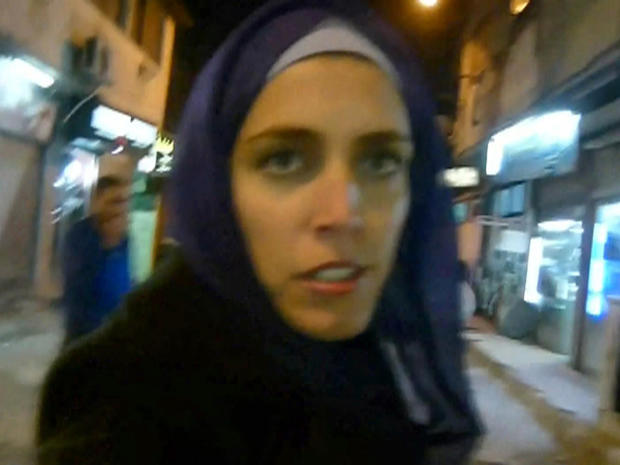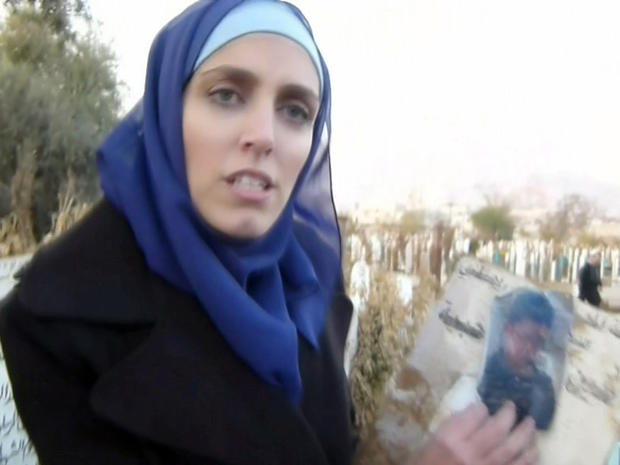Inside Syria: A rare look into the uprising
DAMASCUS, Syria - For more than 40 years, the Assad dictatorship has controlled virtually every aspect of life inside Syria, and who on the outside gets to see it. But now, a revolution is under way to force Bashar Assad out. CBS News has managed to get in to witness it.
Since the spring, thousands of Syrians have been marching in the streets, demanding their freedom. Assad responded to the challenge, as his father before him always did, with violence - thousands of civilians have been killed out of public view. Just today, activists reported more than 60 deaths in the city of Homs.
Complete coverage: Anger in the Arab worldFor months, most of what we've seen of the revolution in Syria has come from cell phone video of demonstrations met with bullets from security forces. Carrying only a small camera, CBS News correspondent Clarissa Ward entered Syria as a tourist, without government supervision, to meet the people holding those cell phones.
Read Clarissa Ward's blog: Sneaking into Syria
Opposition activist Razan Zaytouni insists on using her real name. The Syrian regime already knows who she is - she's in hiding to avoid arrest.
"Are you scared," Ward asked.
"Who is not," she replied. "But we have to continue. We decided to start our revolution, this is what we have been dreaming of long time ago."
Zaytouni took CBS News to the Damascus suburb of Douma and attended the funeral of a 16-year-old boy, who the people say, was shot by security forces at a protest the day before. Men and women poured into the funeral by the hundreds. Their grief was tinged with defiance. "This is the real Syria," one man said. "If you come you will see real bodies. They are not stones, they are not toys. They are real bodies."
They want international military support and they say they will not give up their protest until President Assad's regime falls. A military helicopter circled overhead, but the chanting only grew stronger. "We are peaceful, and they are shooting us," the crowd shouted. "We want freedom."
There's a special graveyard for protesters who have been gunned down in Douma. Here they're called shaheed or martyrs. There are 60 graves. A man handed Ward a photograph. He said it's of a family member who was only 13-years-old when he was killed.
The U.N. estimated in early November that at least 4,000 people had been killed. Activists tell CBS News the number is much higher.
But the violence has only fuelled the protests which are creeping closer to the heart of the capital, Damascus. In the suburbs just outside of Damascus people are out every single night and they're demanding an end to the regime. The protesters had rarely seen reporters from outside the country. They handed us notes. One read, "We don't shed tears for the martyrs, we shed tears for the cowards."
Later on, Zaytouni introduced us to people who have paid a high price for demonstrating against the Assad regime. Five months after being shot three times at a protest, the 20-year-old man is still bed-ridden. But he says, the minute he can walk, he will be back on the streets marching for freedom. He told Ward, the regime is the devil.
Certainly, it's a regime that shows no signs of lifting its crackdown on the opposition. Activist Razan Zaytouni has a message for Assad. "Leave! Leave now because you know that you will leave at the end but with more victims, with more suffering of the people. So just leave and leave us to start our new future our new country. You got enough of our blood."
CBS Evening news anchor Scott Pelley asked Clarissa Ward what the people wanted from the Assad government.
"In the short term, they want for Assad's regime to be overthrown," Ward replied. "More broadly speaking, this is really a battle for freedom. I spoke with one young man, and he said something that really stuck with me. He said, you know the main purpose of this, all we really want is to be able to speak our minds without being afraid."
"You were traveling alone, linking up with the opposition," Pelley said. "Tell me a little bit about what that was that like?"
"It's incredibly challenging," Ward replied. "Because all of the opposition activists that I was with are wanted by Assad's forces. Just outside the capital, there are checkpoints every other block. If these activists are stopped at these checkpoints, it means certain arrest."


